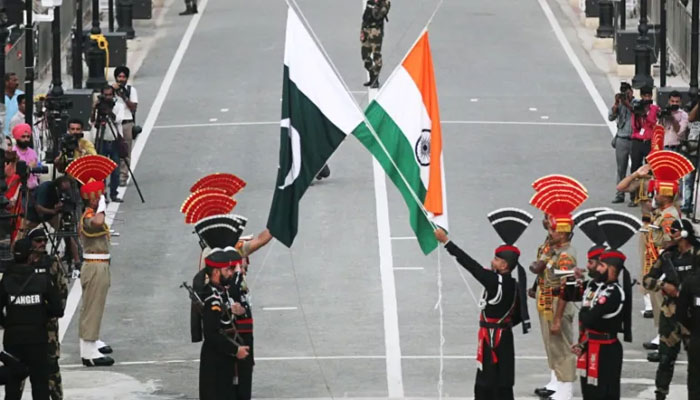A case for peace in South Asia
Policymakers cannot rely solely on wishful thinking in charting the future course of action
The strategic imperative for peace between Pakistan and India is undeniable, given their status as declared nuclear powers with the capacity to inflict severe damage on each other in the event of an all-out war.
The argument for peace is further strengthened by the widespread poverty both nations face and the corresponding need to allocate their resources toward economic development rather than military spending.
A relationship marked by good neighbourliness and freedom from tension would also open up mutually beneficial opportunities in trade and economic cooperation, along with potential collaboration in areas such as environmental protection, river water sharing, and cross-border disease control.
However, policymakers cannot rely solely on wishful thinking in charting the future course of action. Instead, our approach must be grounded in the strategic realities at national, regional, and global levels to identify viable policy options for our leaders in the long-term management of Pakistan-India relations. Herein lie significant challenges to realising the full potential of a peaceful, cooperative, and tension-free relationship between the two countries.
At the national level, India has seen a significant shift to the right in its internal politics since Narendra Modi became prime minister in 2014, marked by his anti-Muslim bias, notably evident during the anti-Muslim riots of 2002 in Gujarat. Despite the BJP’s reduced support under Modi’s leadership in the recent Indian elections, it is unlikely that the party will abandon its commitment to Hindutva or Hindu nationalism, which aims to define Indian culture solely through Hindu values.
According to definitions of Hindutva by RSS leaders, with whom the BJP is closely allied, Muslims and other minorities in India are expected to continue facing atrocities and social discrimination from Hindutva supporters in the years ahead.
The harsh anti-Muslim stance of Hindutva advocates within India is also reflected in its approach to relations with Pakistan, particularly on issues like Kashmir. It was therefore not entirely surprising when, in 2019, the Modi government revoked the autonomous status of Occupied Kashmir and introduced demographic changes to the detriment of its Muslim population.
Under the influence of Hindutva, the Modi government has generally adopted a belligerent style of diplomacy in its dealings with Pakistan, as evidenced by its alleged sponsorship and financing of terrorism in Pakistan, particularly in Balochistan and Khyber Pakhtunkhwa; the arrest of Indian naval officer Kalbhushan Jadhav in Balochistan in March 2016 for subversive activities; the Indian airstrike in Balakot in February 2019; and the hardening of India’s stance on Kashmir.
India’s rapid economic growth, which has propelled it to the fifth-largest economy globally, contrasts sharply with the serious economic challenges facing Pakistan, significantly weakening Pakistan's strategic position relative to India. India’s GDP was estimated to be $3.7 trillion in 2023 as against $374 billion only for Pakistan in 2023-24.
Even more worrying is the fact that India’s GDP is growing at the rate of 6.9 per cent per annum currently as against only 2.8 per cent in the case of Pakistan’s GDP. Thus, the imbalance in economic power is increasingly turning against Pakistan with time. This should be a matter of serious concern for Pakistan’s policymakers as economic and technological strength is the most important element of national power in the modern world. On the military side also, the strategic situation is turning to Pakistan’s disadvantage with India’s defence budget estimated to be $83.6 billion as against $8.5 billion for Pakistan currently.
The growing weight of India’s economic and military power inevitably will have adverse consequences for Pakistan as the former by no means is a benign power as its history of dealings with its neighbours and its hegemonic designs in the region demonstrate. Pakistan which was dismembered by India through its invasion of East Pakistan in 1971 does not need a reminder of India’s aggressive approach to dealing with its neighbours in pursuit of its hegemonic designs in the region which have been noted by reputed international scholars like Brzezinski and Kissinger.
For instance, Brzezinski in his book ‘Strategic Vision – America and the Crisis of Global Power’, commented, “Indian strategists speak openly of a greater India exercising a dominant position in an area ranging from Iran to Thailand. India is also positioning itself to control the Indian Ocean militarily”.
The growth of India’s economic and military power has provided it with the resources required for the realisation of its hegemonic designs in the region and its global ambitions. Its membership of G-20 and BRICS, its candidature for permanent membership of the UN Security Council, and its growing reach into the Gulf region are indicators of its growing international stature. Its strategic partnership with the US bilaterally and through the membership of the Quad to counter China in the Indo-Pacific region has given it increased strategic prominence at the regional and global levels.
In strategic alignment with the US, India is also firmly opposed to CPEC and the expansion of China’s influence in South Asia, thus providing another source of tensions with Pakistan which is engaged in developing its own strategic cooperation with China partly to correct the strategic imbalance created in South Asia by the growing Indo-US strategic partnership.
Keeping in view the foregoing, the prospects of a substantial improvement in Pakistan-India relations will remain remote as long as India continues to pursue its hegemonic ambitions in South Asia, shows little inclination to resolve outstanding Pakistan-India disputes, especially the Kashmir dispute, and maintains its belligerent style of diplomacy in its dealings with Pakistan.
Indian Foreign Minister Jaishankar’s refusal to engage in bilateral dialogue with his Pakistani interlocutors during his recent visit to Islamabad to attend the SCO Summit reflected New Delhi’s hard-line attitude. In such a scenario one cannot realistically expect rapid progress towards a substantial improvement in relations between the two countries in the foreseeable future.
Because of the strategic imperative of peace, a tension-free and good neighbourly relationship with India should remain Pakistan’s foremost policy objective. Pakistan must explore all possibilities for reducing tensions in its relations with India on the basis of mutual respect for each other’s independence and territorial integrity, non-interference in each other’s internal affairs, and mutual benefit.
Our immediate policy goal should be the normalisation of Pakistan-India relations and the resumption of mutually beneficial trade between them on a level playing field. However, in the ultimate analysis realpolitik and power dynamics will determine the trajectory of Pakistan-India relations in the years to come. Political stability in Pakistan and its economic strength and progress, therefore, will be important prerequisites for giving a positive direction to Pakistan-India relations.
The writer is a retired ambassador and author of ‘Pakistan and a World in Disorder – A Grand Strategy for the Twenty-First Century’. He can be reached at: javid.husain@gmail.com
-
 Cardi B Finally Responds To Accusations About Destroying 'SNL' Set After Nicki Minaj Joke
Cardi B Finally Responds To Accusations About Destroying 'SNL' Set After Nicki Minaj Joke -
 Gorton And Denton By-election Result: Green Party Defeats Labour In Blow To Keir Starmer
Gorton And Denton By-election Result: Green Party Defeats Labour In Blow To Keir Starmer -
 Jack Dorsey Cuts 4,000 Roles, Says AI Requires Smaller Teams
Jack Dorsey Cuts 4,000 Roles, Says AI Requires Smaller Teams -
 Reggie Bannister Health Takes ‘difficult Turn’ Amid Dementia, Parkinson’s Battle
Reggie Bannister Health Takes ‘difficult Turn’ Amid Dementia, Parkinson’s Battle -
 'Humble Traitor' Rob Rausch Makes Unexpected Move After Betraying Maura Higgins In Season 4
'Humble Traitor' Rob Rausch Makes Unexpected Move After Betraying Maura Higgins In Season 4 -
 Sarah Ferguson Drops An Accusation Against Andrew? ‘He Just Wants Leverage’
Sarah Ferguson Drops An Accusation Against Andrew? ‘He Just Wants Leverage’ -
 Anthropic Rejects Pentagon Military AI Proposal, Holds Firm On Safety Guardrails —What’s Next?
Anthropic Rejects Pentagon Military AI Proposal, Holds Firm On Safety Guardrails —What’s Next? -
 'Traitors' Reunion Drama: Rob Rausch Defends Strategy, Makes Shocking Revelation After Victory
'Traitors' Reunion Drama: Rob Rausch Defends Strategy, Makes Shocking Revelation After Victory -
 Inside Hillary Clinton’s Epstein Testimony: Key Takeaways And Highlights Explained
Inside Hillary Clinton’s Epstein Testimony: Key Takeaways And Highlights Explained -
 'Too Hard To Be Without’: Woman Testifies Against Instagram And YouTube
'Too Hard To Be Without’: Woman Testifies Against Instagram And YouTube -
 Kendall Jenner Recalls Being ‘too Stressed’: 'I Want To Focus On Myself'
Kendall Jenner Recalls Being ‘too Stressed’: 'I Want To Focus On Myself' -
 Ethel Kennedy’s 34 Grandchildren And The Expanding Kennedy Family Legacy
Ethel Kennedy’s 34 Grandchildren And The Expanding Kennedy Family Legacy -
 Dolly Parton Achieves Major Milestone For Children's Health Advocacy
Dolly Parton Achieves Major Milestone For Children's Health Advocacy -
 'The White Lotus' Creator Mike White Calls 'Survivor' Fans 'sadistic'
'The White Lotus' Creator Mike White Calls 'Survivor' Fans 'sadistic' -
 Oilers Vs Kings: Darcy Kuemper Pulled After Allowing Four Goals In Second Period
Oilers Vs Kings: Darcy Kuemper Pulled After Allowing Four Goals In Second Period -
 Calgary Weather Warning As 30cm Snow And 130 Km/h Winds Expected
Calgary Weather Warning As 30cm Snow And 130 Km/h Winds Expected




